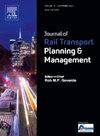在严重交通中断时重新安排列车并考虑乘客的保留情况
IF 2.7
Q3 TRANSPORTATION
Journal of Rail Transport Planning & Management
Pub Date : 2025-10-08
DOI:10.1016/j.jrtpm.2025.100551
引用次数: 0
摘要
列车调度对于确保旅客运输的准时性和可靠性至关重要,特别是在像中国这样有座位预留机制的铁路系统中。在出现中断的情况下,例如,4小时段堵塞,持有中断列车预订的乘客面临重大的旅行计划改变。由于这些滞留乘客自行转换其他旅行时间和/或方式的灵活性往往受到预先预订的车票和不频繁的服务的限制,他们很可能会等待他们预订的火车很长时间,对乘客满意度造成负面影响。在本研究中,我们提出了一种从旅客预订角度来解决这一问题的方法。在有效时间窗口(ETW)的限制下,有条件地使用增加站点和增加列车的措施,以及重新计时、重新排序和局部改道,为滞留旅客提供其他旅行选择,使他们能够以最小的延误到达目的地。为了准确地捕捉ETW的局限性,我们通过引入替代弧集重构了时空网络,然后建立了ILP模型。然后使用拉格朗日松弛解方法解决这个np困难问题,该方法集成了分解方法、标签校正算法和启发式算法。我们还对中国高速铁路网进行了计算实验,验证了我们提出的方法的可行性、有效性和效率,并进行了实验分析,以帮助调度员在日常运营中做出更明智的决策。本文章由计算机程序翻译,如有差异,请以英文原文为准。
Train rescheduling with consideration of passenger reservicing during severe disruptions
Train dispatching is critical for ensuring the punctuality and reliability in passenger transportation, especially in railway systems with a seat reservation mechanism, such as that in China. In the presence of a disruption, e.g., a 4-h segment blockage, passengers holding reservations on disrupted trains face significant travel plan alterations. As the flexibility for these stranded passengers to self-shift to alternative travel times and/or modes is often limited with pre-booked tickets and infrequent services, they are very likely to wait for their reserved trains for a long time, causing negative consequences on passenger satisfaction. In this study, we propose a method to address this rescheduling problem from the perspective of passenger reservicing. Measures of adding extra stops and inserting extra trains are conditionally used with the limitation of an effective time window (ETW), alongside retiming, reordering, and local-rerouting, to offer alternative travel options for stranded passengers, enabling them to reach their destinations with minimal delays. To accurately capture the limitation of ETW, we reconstructed the space-time network by introducing an alternative arc set, followed by formulating an ILP model. This NP-hard problem is then solved using a Lagrangian relaxation solution method, which integrates a decomposition approach, a label correcting algorithm, and a heuristic algorithm. We also conduct computational experiments on the Chinese high-speed railway network to validate the feasibility, effectiveness, and efficiency of our proposed method, and perform experimental analysis to help dispatchers to make more informed decisions in daily operations.
求助全文
通过发布文献求助,成功后即可免费获取论文全文。
去求助
来源期刊

Journal of Rail Transport Planning & Management
TRANSPORTATION-
CiteScore
7.10
自引率
8.10%
发文量
41
 求助内容:
求助内容: 应助结果提醒方式:
应助结果提醒方式:


